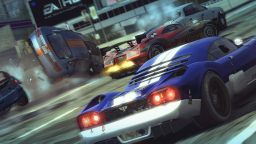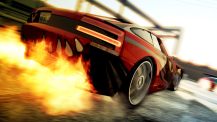Burnout Paradise represents an interesting
change of pace for the arcade-style racing franchise, moving it from a
straight-up action game into an open-ended approach more like EA's Need
for Speed titles. Instead of racing individual events and unlocking
various races from a map menu, the new installment takes on an open-ended
approach that gives the game an expansive feel that's far more immersive.
What's most impressive about Burnout Paradise is that it does this without
losing the exciting, intense racing action the series has become known
for. Despite this change in focus, all of the famous Burnout moves such as
the takedowns, grinds and drifts you come to know are very much present.
However, this new open world racing approach makes for a much larger world
to explore, it also means that the racing courses are more complicated and
harder to navigate. In order to help players find their way around
Paradise City, the game implements a new GPS map system which shows your
location in the city and points out your route. There's also a compass
that shows you the general direction of your destination. While you're in
the heat of a race, you'll have to make some sharp turns at some areas. To
help you in the right direction, street signs appear on the sides of your
compass, indicating which street to go down and the GPS also issues a few
short beeps to give you a warning. It takes some getting used to, but this
system definitely helps to keep you on the right track. There will be some
times when you miss a turn, but you can use the e-brake to spin 180
degrees quickly and get back on track. You can also use this to perform
some impressive drifts maneuvers as well.
 While
you're racing around Paradise City, you'll be able to pull into a variety
of locations in order to help you along. There are three basic types of
stores scattered throughout the city. The first of these are Junkyards,
where your vehicles are stored, and where you can change the car you're
driving. You can also find repair shops that will eliminate any damage to
your vehicle, gas stations that fully charge your boost and paint shops
which will give your car an almost instantaneous makeover. When you drive
through one of these locations, they'll be added to your GPS and appear on
your map, allowing you to locate them easily. Knowing their location can
be critical during races, especially when your vehicle takes on a lot of
damage. Burnout Paradise's open ended structure means that you'll need to
rely on the GPS and mapping features in order to win races and find the
hidden sections in the city.You start with a small garage containing a
single car but more vehicles can be unlocked later on by winning races,
taking out rivals and earning license upgrades. You begin by rolling
through the streets and highways of Paradise City where you have the
freedom to race virtually anywhere on the map.
While
you're racing around Paradise City, you'll be able to pull into a variety
of locations in order to help you along. There are three basic types of
stores scattered throughout the city. The first of these are Junkyards,
where your vehicles are stored, and where you can change the car you're
driving. You can also find repair shops that will eliminate any damage to
your vehicle, gas stations that fully charge your boost and paint shops
which will give your car an almost instantaneous makeover. When you drive
through one of these locations, they'll be added to your GPS and appear on
your map, allowing you to locate them easily. Knowing their location can
be critical during races, especially when your vehicle takes on a lot of
damage. Burnout Paradise's open ended structure means that you'll need to
rely on the GPS and mapping features in order to win races and find the
hidden sections in the city.You start with a small garage containing a
single car but more vehicles can be unlocked later on by winning races,
taking out rivals and earning license upgrades. You begin by rolling
through the streets and highways of Paradise City where you have the
freedom to race virtually anywhere on the map.
In order to compete in the various
events, you need to go to any of Paradise City's intersections, hold the
L2 and R2 buttons down and that race begins immediately. As you'd expect,
all of the standard events are present including standard races, where you
have to cross the finish line and Road Rage where you have to complete a
certain number of takedowns. Paradise also includes some other more
interesting modes such as Marked Man, where the other drivers will attack
you and the object is to survive the race before they knock you out.
There's also a stunt mode where you have to perform jumps, drifts and
other stunts to achieve a target score before the timer runs out. You can
also race one-on-one against a rival or beat a set time in the Burning Lap
mode. Most of the intersections have a race you can compete in, though
some require you to use a specific vehicle which can be annoying. Each
successful race adds another point onto your license, and winning the
required number of events for each license upgrades your vehicle and opens
up the next level of challenges. This structure gives you a great deal of
freedom in how you race and what order you'll compete in, giving you a
non-linear racing experience where you feel like you're in control of your
fate, not the other way around.
Burnout Paradise's sandbox structure has
the benefit of reducing load times to almost nothing which allows you to
play for hours without losing momentum, which means you can unlock
additional vehicles and earn license upgrades relatively quickly. The
drawback to this approach comes in the fact that you cannot restart a race
you've just lost immediately, and have to drive back to the starting
intersection to play it again. This can be annoying, especially when
you're faced with long-distance runs. Unfortunately, there's no way around
this and it can definitely make the gameplay feel disconnected. To
mitigate this, the sheer number of intersections available in Paradise
City means you're never too far from another starting point, and you can
always get back to that section later. While this new approach does take
some adjustment, the benefits definitely outweigh the drawbacks, giving
Burnout Paradise a refreshingly different feel this time around.
 From
a visual standpoint, this is far and away the best looking title in the
franchise to date. By using a thoroughly realized city as its backdrop,
Burnout Paradise creates a much more coherent and believable experience.
Trackside objects are punctuated with massive urban skyscrapers in some
sections, while other take you into impressively rendered natural sections
with twisting mountain back roads. The game uses light-sourcing,
environmental effects and detailed modeling techniques to create a
stunningly realistic racing course that seems to fit together seamlessly.
Most impressive is the game's sheer sense of speed and velocity, which
makes for some truly intense, split-second races where you'll be on the
edge of your seat from start to finish. Most impressive is the game's
consistent, incredibly fast frame-rate which remains unrelenting
throughout. Burnout Paradise is easily one of the fastest overall racers
we've ever played and takes the speed and ferocity that players have come
to expect from the series to another high-water mark this time around.
Obviously, the car models used look absolutely stunning in their level of
detail and realism, which helps to make the massively over-the-top crash
and destruction animations have even more of an impact. Each crash is
rendered in slow-motion detail, as you watch the vehicle's twist and turn,
fly over themselves, crash into walls while their frames collapse, break
apart and explode in all directions. These animations are really cool to
watch, and as usual, give the game a visceral excitement that other racing
titles lack. These massive crash animations give the game an elaborate,
slick production polish that really screams on the PS3, fully showcasing
the console's processing power. The game's hard-rocking soundtrack
features an array of new and upcoming bands like LCD Soundsystem, though
the annoying DJ gets on your nerves very quickly.
From
a visual standpoint, this is far and away the best looking title in the
franchise to date. By using a thoroughly realized city as its backdrop,
Burnout Paradise creates a much more coherent and believable experience.
Trackside objects are punctuated with massive urban skyscrapers in some
sections, while other take you into impressively rendered natural sections
with twisting mountain back roads. The game uses light-sourcing,
environmental effects and detailed modeling techniques to create a
stunningly realistic racing course that seems to fit together seamlessly.
Most impressive is the game's sheer sense of speed and velocity, which
makes for some truly intense, split-second races where you'll be on the
edge of your seat from start to finish. Most impressive is the game's
consistent, incredibly fast frame-rate which remains unrelenting
throughout. Burnout Paradise is easily one of the fastest overall racers
we've ever played and takes the speed and ferocity that players have come
to expect from the series to another high-water mark this time around.
Obviously, the car models used look absolutely stunning in their level of
detail and realism, which helps to make the massively over-the-top crash
and destruction animations have even more of an impact. Each crash is
rendered in slow-motion detail, as you watch the vehicle's twist and turn,
fly over themselves, crash into walls while their frames collapse, break
apart and explode in all directions. These animations are really cool to
watch, and as usual, give the game a visceral excitement that other racing
titles lack. These massive crash animations give the game an elaborate,
slick production polish that really screams on the PS3, fully showcasing
the console's processing power. The game's hard-rocking soundtrack
features an array of new and upcoming bands like LCD Soundsystem, though
the annoying DJ gets on your nerves very quickly.
While the new approach will take some
players some time to become accustomed to, Burnout Paradise represents a
significant step forward. It's open-ended design allows players a great
deal of freedom to navigate the city streets while the sheer number of
races and game modes that you can discover means that the game will keep
you occupied for many hours. This open approach can be a bit confusing and
frustrating at times, but the sense of openness more than makes up for it.
Using the maps and GPS systems helps to keep you in the right direction.
Visually, the game is quite impressive with state-of-the-art visuals and
animation leading to some truly spectacular races that provide an intense
rush of speed and velocity unmatched by many other racers. Burnout
Paradise is an impressive technical achievement that delivers some truly
exciting racing in a brilliantly designed, almost seamless open-ended
world. It's definitely one of the most technically impressive driving games
on the market, though its flaws drag it down a bit.
- Michael Palisano
Grade: B+

